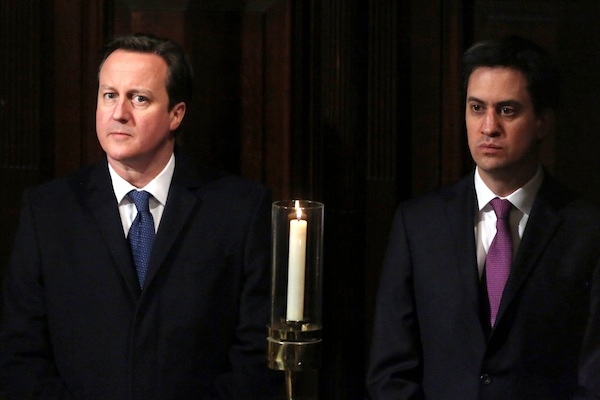Well, the Labour party certainly knows how to give the appearance of a fight when its back is against the wall. Many MPs and supporters have spent quite a lot of this fine autumn day tweeting frantically that this morning’s unpleasant headlines (summarised in their full gory glory by James here) are a plot by the media to stop their thoroughly decent leader making it to Downing Street and why aren’t we all writing about the problems that David Cameron has with the Conservative party instead?
They protest too much: if lobby journalists were organised enough to compile time sheets, most of us would quite clearly have spent the bulk of our time since the 2010 election writing about Tory misery, not Labour. In fact, the Labour party might have a thing or two to learn from the endless chronicles of Conservative unrest:
1. Don’t pretend bad headlines are just nonsense.
Alright, tell the chap with the camera and the microphone that the headlines are nonsense, but have a good long think about why more and more of your frontbenchers seem keen to brief journalists about their dissatisfaction.
David Cameron’s woes have stemmed from and then been exacerbated by his failure to listen to what his party has to tell him. Miliband has up to this point been much better at giving the impression he’s interested in his backbenchers (and his chief whip Rosie Winterton is an unsung hero who has made this easier too), but if the stories of the past week are dismissed as journalists making stuff up without the points being advanced by anonymous Labourites being considered, then Miliband won’t find that his ‘leadership crisis’ goes away.
He and colleagues should remember that one of the most savage front pages today is not on an angry right-wing newspaper, but the Observer, which the Labour leader regularly uses to set out his agenda (this is also part of his problem: he relies too much on his friends in the media rather than trying to persuade less amenable outlets with access to wider territories of voters). Incidentally, I suggest in today’s Observer that by banging on too much about the mean media, Miliband will further wound his chances with the wider electorate.
2. Make sure your party actually knows what’s going on.
Number 10 at its worst is confusing, lacking in conviction and prone to announcing major policies only when it has realised that it will suffer a serious rebellion in the House of Commons. Miliband’s own office frustrates the rest of his party because it is confused and often lacks a firm conviction about what Miliband wants to do.
This means that just as mixed messages from the Tory high command have in the past led to bigger problems than necessary, mixed messages from Miliband’s team leave different parts of the party doing and believing different things. Is it safe to support this campaign or attend this meeting? Labour MPs and candidates aren’t always told the right thing, and sometimes end up on the naughty step after doing something they thought perfectly acceptable.
This applies to the whole party, but there is a specific lesson for the way the Labour leader handles the dysfunctional shadow cabinet. It is simply not fair to allow members of your team to brief against frontbenchers while also not allowing those frontbenchers a fair crack at the whip, which is what has happened increasingly over the past few months.
The shadow cabinet is often blamed as a weak link in the party, and there is certainly a fair amount of evidence for that, but the weakness does partly stem from the leadership preventing shadow ministers from making announcements, and leaving them with nothing to say at the party conference, for instance.
The ministers who seem to get the most leeway are either those Ed feels are his (there’s a problem right there with having a shadow cabinet where some of the members aren’t really die-hard Ed supporters but are also impossible to move), or those who pose a strong threat, such as Andy Burnham, a powerful possible leadership contender and a man who makes many announcements and wins internal policy battles.
3. Understand what true loyalty is.
The shadow cabinet put in a strong showing on Friday to defend Ed Miliband, even if some of them pitched their enthusiasm for their leader at a rather incredible level (Tristram Hunt exclaimed that he was ‘enormously excited’ that a Labour government was only 180 says away). Perhaps they need to have more reasons to make a show of loyalty rather more natural when it is required in future.
One of the things that has made Labour appear far more united than the Conservatives throughout this Parliament is certainly Miliband’s better manner with his backbenchers, but another important element is the way the party cracks down on dissent.
The Tory whips have often failed to stop criticism spinning out of hand in their party, but at the other extreme, the Labour party makes life nigh-on impossible for anyone who thinks it’s worth saying anything vaguely off-message, let alone critical, in public. No-one serious has gone public with their concerns about Miliband because they don’t really think there’s time to replace him and reunite the party before the general election and they cannot see sufficient numbers of colleagues joining them for their public stance to change things in the party. But a dearth of names on the record does not make for a happy, loyal Labour. Miliband wants a party that wants to praise him, rather than feels it has to because otherwise things will get worse.







Comments